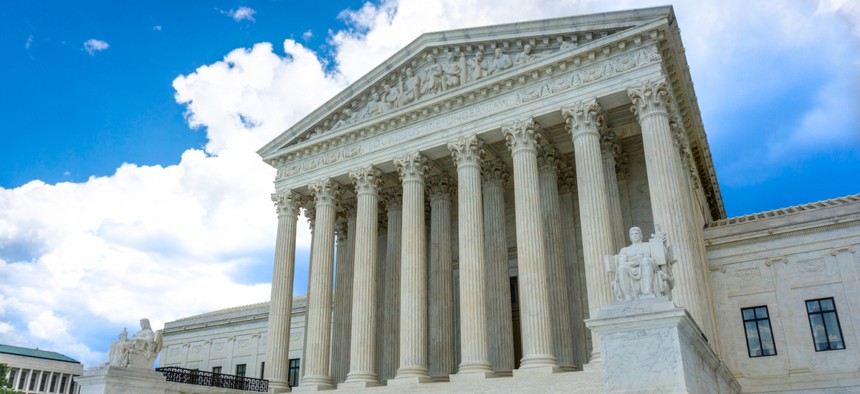Connecting state and local government leaders
The full implications of the ruling on criminal justice—and maybe other areas of the law—are not yet known as Oklahoma negotiates with tribes in wake of the verdict.
Much of eastern Oklahoma is a tribal reservation, the Supreme Court ruled this week in a decision that has implications for how serious criminal cases involving tribal members in the state are handled.
In a 5-4 decision written by Justice Neil Gorsuch, the court found that treaties made with the Muscogee (Creek) Nation in the 1800s still bind the land as Indian Country for the “purposes of federal criminal law.”
“On the far end of the Trail of Tears was a promise,” Gorsuch wrote. “Forced to leave their ancestral lands in Georgia and Alabama, the Creek Nation received assurances that their new lands in the West would be secure forever … Because Congress has not said otherwise, we hold the government to its word.”
Gorsuch was joined by the court’s liberal bloc: Justices Ruth Bader Ginsburg, Stephen Breyer, Sonia Sotomayor, and Elena Kagan.
The case was brought to the high court by Jimcy McGirt, an enrolled tribal member of the Seminole Nation of Oklahoma. McGirt was convicted in Oklahoma state court of three sexual offenses, including the rape of an underage child, but has since argued that because his crimes took place on the Creek Reservation as defined by an 1866 treaty, the state lacked the jurisdiction to prosecute him. His attorneys argued he should instead be retried in federal court under the Major Crimes Act of 1885, which allows the federal government, but not states, to prosecute tribal members for certain serious crimes on Indian land.
A ruling in favor of McGirt could mean that he will get that retrial now, but it also poses broader questions about the administration of justice in the parts of Oklahoma that have now been ruled to be Indian Country, as well as the validity of convictions similar to McGirt’s involving crimes committed by native people on tribal land. The justices, however, noted that the “scope of their dispute is limited” and that no ruling “could unsettle Oklahoma’s authority to try non-Indians for crimes against non-Indians on the lands in question.”
Oklahoma insisted that the land in question, part of a reservation that once encompassed three million acres including much of the city of Tulsa, had been dissolved in the “allotment era,” a period starting in the 1880s where Congress pressured tribes to divide up communally-owned land into smaller parcels owned by individual tribe members. While some of those parcels were eventually sold to non-Indians, the court held that “Congress does not disestablish a reservation simply by allowing the transfer of individual plots, whether to Native Americans or others,” meaning those purchasers own the land, but it is still considered Indian Country.
“For years, states have sought to suggest that allotments automatically ended reservations, and for years courts have rejected the argument,” the majority opinion reads. “Oklahoma reminds us that allotment was often the first step in a plan ultimately aimed at disestablishment.”
In his dissent, Chief Justice John Roberts echoed concerns raised by Oklahoma’s lawyers, mainly that the state’s “ability to prosecute serious crimes will be hobbled and decades of past convictions could well be thrown out” and that the decision “creates significant uncertainty for the State’s continuing authority over any area that touches Indian affairs, ranging from zoning and taxation to family and environmental law.”
Justices Clarence Thomas, Samuel Alito, and Brett Kavanaugh signed on to the chief justice’s dissent.
While the impacts on legal areas like zoning and taxation are currently unclear, they could be determined by negotiations between elected officials of the tribes in eastern Oklahoma and the state and federal government. Many native legal scholars say that concerns about a significant overhaul of the state’s criminal justice system are overblown.
Those in the majority opinion were also unsympathetic to the claims that the opinion would overturn a huge number of convictions or force many criminal cases out of state court in the future. An analysis by The Atlantic earlier this year found that the likely number of cases that would qualify for a new trial based on the ruling is less than 200.
Oklahoma also warned that federal and tribal courts now with wider jurisdictions would suffer from increased caseloads. While Gorsuch agreed that shifting cases like McGirt’s out of state court and into federal court might initially lead to understaffed federal prosecutors offices and overstaffed state prosecutors offices, he concluded “it doesn’t take a lot of imagination to see how things could work out in the end.”
Finally, the court said that even if concerns did bear out to be true, they rejected the line of argument that because “the price of keeping [promises] has become too great … we should just cast a blind eye.”
Native advocates and legal scholars celebrated the decision as a victory not just for the Muscogee (Creek) Nation, but also for Native American sovereignty more broadly. Fawn Sharp, the president of the National Congress of American Indians said that the question “has loomed over federal Indian law” for years, but that the Oklahoma land will now “forever be considered, Indian Country—as guaranteed in their treaty relationship with the United States.”
After the verdict, Oklahoma Attorney General Mike Hunter, along with the Nations of the Muscogee (Creek), Cherokee, Chickasaw, Choctaw, and Seminoles, released a joint statement saying that they are committed to ensuring all “offenders face justice for the crimes for which they are accused.” The tribes and the state are further “committed to implementing a framework of shared jurisdiction that will preserve sovereign interests and rights to self-government while affirming jurisdictional understandings, procedures, laws, and regulations that support public safety, our economy, and private property rights.”
Emma Coleman is the assistant editor for Route Fifty.
NEXT STORY: How COVID-19 in jails and prisons threatens nearby communities




